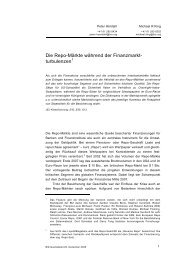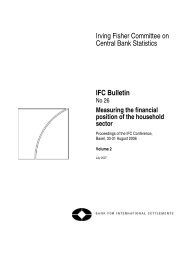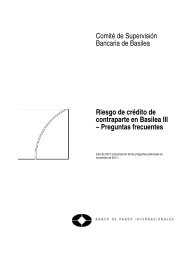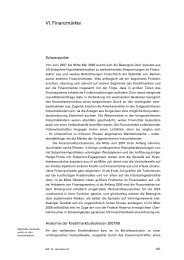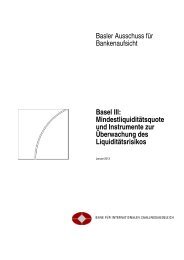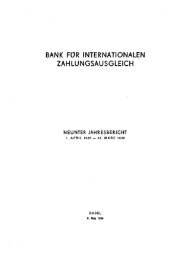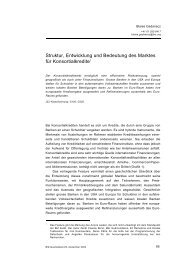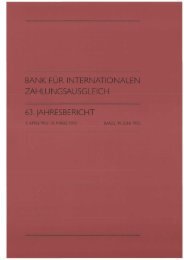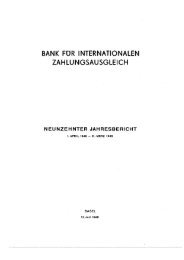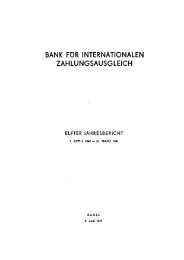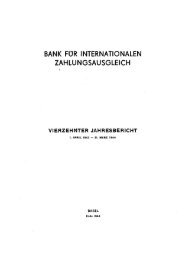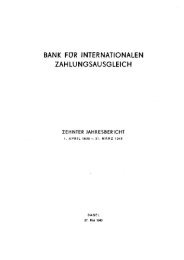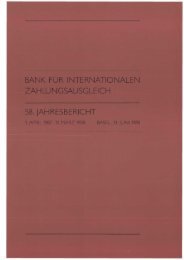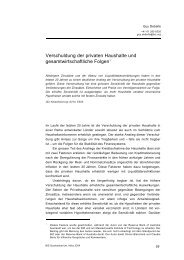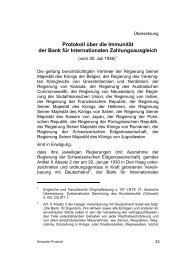Payment systems in Tanzania - Bank for International Settlements
Payment systems in Tanzania - Bank for International Settlements
Payment systems in Tanzania - Bank for International Settlements
Create successful ePaper yourself
Turn your PDF publications into a flip-book with our unique Google optimized e-Paper software.
- 194 - <strong>Tanzania</strong><br />
capabilities; speed up exchange and settlement of funds and securities; and to migrate, <strong>in</strong> the long<br />
term, from cash to cash-less modes of payment.<br />
Also along with this project are improvements which are currently <strong>in</strong> the implementation<br />
stage. These are: document process<strong>in</strong>g us<strong>in</strong>g MICR technology; <strong>in</strong>terbank communication network<br />
us<strong>in</strong>g the <strong>Bank</strong> of <strong>Tanzania</strong> backbone; media exchange process<strong>in</strong>g us<strong>in</strong>g diskettes <strong>for</strong> bulk recurr<strong>in</strong>g<br />
payments; and transmission of domestic secured payment <strong>in</strong>structions us<strong>in</strong>g S.W.I.F.T. architecture.<br />
There are factors that have contributed favourably to the process of modernisation which<br />
<strong>in</strong>clude: the country has been undergo<strong>in</strong>g major political and economic re<strong>for</strong>ms over the past decade;<br />
the f<strong>in</strong>ancial sector and markets are be<strong>in</strong>g liberalised <strong>for</strong> both private and <strong>for</strong>eign <strong>in</strong>vestments; the fact<br />
that the current legal framework is rather fragmented and outdated, fraught with <strong>in</strong>adequacies and<br />
<strong>in</strong>capable of regulat<strong>in</strong>g the National <strong>Payment</strong> Systems; the public need <strong>for</strong> efficient payment <strong>systems</strong><br />
to serve a new market economy; and the <strong>Bank</strong> of <strong>Tanzania</strong> management commitment to the project<br />
and a dedicated project team work<strong>in</strong>g on full time basis and <strong>in</strong> coord<strong>in</strong>ation with other Southern<br />
Africa Development Community (SADC) countries.<br />
1. INSTITUTIONAL ASPECTS<br />
1.1 General legal aspects<br />
There is no general legislation govern<strong>in</strong>g the payment <strong>systems</strong> <strong>in</strong> <strong>Tanzania</strong>, though the<br />
<strong>Bank</strong> of <strong>Tanzania</strong> ma<strong>in</strong>ta<strong>in</strong>s a close <strong>in</strong>volvement <strong>in</strong> supervision and regulation. English/common law<br />
is the orig<strong>in</strong> of the law <strong>in</strong> <strong>Tanzania</strong>, while the follow<strong>in</strong>g is the key legislation, which directly touches<br />
on payment <strong>systems</strong>.<br />
(a) The Bills of Exchange Ord<strong>in</strong>ance, Cap. 215<br />
The Bills of Exchange Ord<strong>in</strong>ance, Cap. 215 is a statute <strong>in</strong> pari materia with the Bills of<br />
Exchange Act, 1882 of the United K<strong>in</strong>gdom.<br />
(b) The Evidence Act, 1967<br />
The <strong>Tanzania</strong>n evidence law has its orig<strong>in</strong> <strong>in</strong> India and the United K<strong>in</strong>gdom. Part IV of<br />
the Evidence Act, 1967 provides <strong>for</strong> <strong>Bank</strong>ers Books Evidence.<br />
(c) The <strong>Bank</strong><strong>in</strong>g and F<strong>in</strong>ancial Institutions Act, 1991<br />
The <strong>Bank</strong><strong>in</strong>g and F<strong>in</strong>ancial Institutions Act, 1991 (BAFI) was enacted to consolidate the<br />
law relat<strong>in</strong>g to the bus<strong>in</strong>ess of bank<strong>in</strong>g, to harmonise the operations of all f<strong>in</strong>ancial <strong>in</strong>stitutions <strong>in</strong><br />
<strong>Tanzania</strong>.<br />
(d) The <strong>Bank</strong> of <strong>Tanzania</strong> Act, 1995<br />
The purpose of this Act was to repeal and re-enact the <strong>Bank</strong> of <strong>Tanzania</strong> Act, 1965 so as<br />
to provide more def<strong>in</strong>itively the regulatory and supervisory powers of the <strong>Bank</strong> of <strong>Tanzania</strong> over<br />
other banks and f<strong>in</strong>ancial <strong>in</strong>stitutions. (For a fuller description of this, see Section 1.3.)<br />
(e) The Cheques Act, 1969<br />
The Bills of Exchange Ord<strong>in</strong>ance, Cap. 215, largely governs the use of cheques. The<br />
Cheques Act provides <strong>for</strong> the protection of bankers <strong>in</strong> relation to transactions concluded through<br />
payment by use of cheques and other related <strong>in</strong>struments.



